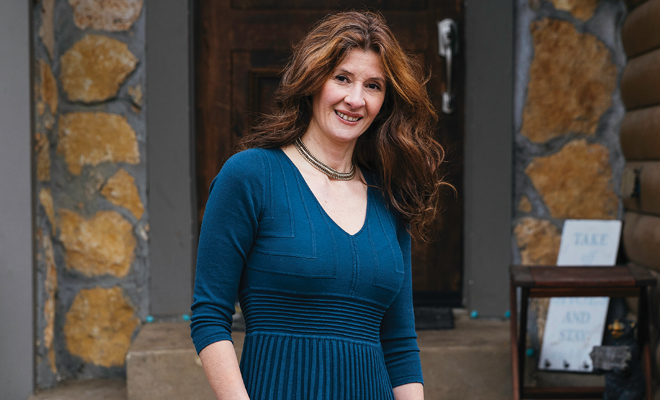 Amber J Deery
Amber J Deery
Iveth Jalinsky: Protecting the Planet for Our Children
She walks the hallways of our national and state legislative offices, and staffers recognize her as the “Bamboo Lady.” But Overland Park, Kansas, businesswoman Iveth Jalinsky considers the nickname quite an accomplishment. As the founder of Green Resources, LLC, she’s driving her mission of repealing laws that ban the importation of bamboo while offering farmers incentives to grow this crop. With this goal, Iveth hopes to reduce our world’s current carbon footprint to save the world for our children and future generations.
“Every month I am knocking on the doors of global institutions, talking with our representatives, senators, the secretary of agriculture, the USDA, the EPA and more,” Iveth noted. “My goal is to change the obsolete laws that are preventing bamboo from becoming an answer for our nation’s farmers and climate change.”
A Sustainable Resource
Why does Iveth hold this plant in such high regard while others have enacted laws to prevent its cultivation? Bamboo has been banned for production in the United States due to claims it is invasive and brings disease to the soil. Iveth asserts bamboo has been given a poor reputation due to unscrupulous individuals who want to shut out this plant to increase the marketing of their own products, such as cotton. In addition, the bamboo species used for industry are particularly susceptible to cold weather. Although it grew in the south, it was nearly impossible to grow in the northern and central areas of the United States.
Yet Iveth knows the benefits bamboo can bring to consumers and the markets. She sees it as part of her vision of global equilibrium, a worldwide balance in the consumption, production and displacement of natural resources in a sustainable and renewable ecosystem. Iveth has worked with numerous scientists and determined a process to get baby bamboo to maturity and hardier to extend its production reach in the United States.
“There are 1,600 different species of bamboo. Its versatile molecules and maximum biomass are stronger than concrete and denser than steel. Thousands of products can be created from bamboo, which offers $72 billion dollars a year to our economy,” advised Iveth. “It can do so much for the farmers and producing bamboo means their incomes could be doubled or tripled. It grows faster than any other tree—seven years on average compared to 75 years with oak to reach maturity.”
When you look at the numbers it’s easy to see why Iveth is sold on bamboo. She shares that bamboo can grow up to three feet per day and can top out at more than a hundred feet. Farmers can cultivate approximately 90 feet of a bamboo shoot from a single plant every month. The current average yield for bamboo is about 24 tons per acre. In comparison, the average yield for most trees is about eight tons per acre, and cotton is about 800 pounds per acre. Also, the water needed for bamboo is about half that required for trees and a small percentage of what is needed for cotton. Bamboo also produces up to 35 percent more oxygen than trees.
Versatile Entrepreneur
Born in Colombia, South America, into a diplomatic family, Iveth lived in Italy, Sweden, Japan, Spain, South Africa and finally landed in this country. She holds a degree as a designer/architect with a master’s in the restoration of fine art and developed an international art business. For the past two decades, she has owned several businesses in the United States, from a museum gallery to a mortgage company to a construction company. Several years ago, she developed a large green commercial and industrial flooring system for national clients such as Walmart and Ace Hardware, to mention a few.
Intrigued by sustainables and renewables to protect the environment, she has served as a vice president with Ampray Solar within the past four years. It was here that Iveth was exposed to the reality of pollutants in air, water and soils. Her research pointed to bamboo as a powerful solution for agricultural, industrial and environmental issues. It can be used in textiles, building materials, furniture, food, fuel and many other things.
“The research and evidence are overwhelming. With bamboo, we can bring jobs, food and improved health to the American people, as well to the rest of the world, while protecting our environment,” remarked Iveth. “We must do this, not only for ourselves, but for our children and their children.”
Bridging the Bamboo Gap
In cooperation with 145 countries and 11,000 environmental and air pollution organizations in the public and private sectors, and within established agreements and protocols, Green Resources connects these different groups, acting as a bridge from one to another, as it focuses on bringing bamboo agroforestry to the United States. Over the next seven years, Iveth and her team are projecting to move at least $26 billion from the worldwide bamboo economic industry to this country. In addition, she will implement the mechanism for every individual, business, corporation and government entity to measure carbon emissions and offset their carbon footprint by using a global energy credit program made up of producers and consumers.
“With its diversity in usability, growth rate and reduced need for pesticides or fertilizers, bamboo is one, if not the best, solution to global climate change. The Bamboo Consortium is made up of hundreds of organizations, groups and individuals attempting to make a difference. Individually, all of them are contributing; however, united, we will make a difference. Our plan includes organizing companies, individuals and strategies into globally effective and implementable solutions. The first steps are here at home in the United States.”
The numbers are there for the United States to take a lead role. In 2018, this country produced about 5.237 billion metric tons of carbon emissions. Iveth suggests we would need approximately 220 million acres of mature bamboo to offset the annual carbon emissions we produce. “By creating a bamboo-rich economic ecosystem, we can reduce our carbon footprint, create or transition thousands of new jobs, provide an alternative fuel and create food and clothing,” commented Iveth. “By working together, in collaboration with other countries around the world, we can save our planet.”
Eco-Hospitality Experiences
But Iveth isn’t only focused on bamboo and the positive impact it can have on the environment. She’s also the developer of IT Luxury Stays, an eco-friendly hospitality business, that also educates guests about environmentally positive processes. She began with a resort in Cleveland, Missouri, called Walnut Ridge Estates and Bamboo Gardens. It has grown to six locations across the United States. “My little business started in my garage, and I let it grow in an organic way,” shared Iveth. “We get around 2,000 guests coming from every corner of the world to experience it. We offer six different eco-luxe experiences and educate guests about them.”
This instruction is based on the resort’s system of self-producing natural gas, providing water created by a UV-filtration system, creating electricity from photovoltaic panels and growing and maintaining massive amounts of timber to offset carbon dioxide levels. “Our exclusive luxury lodging, family-oriented, eco-friendly, sustainable and renewable farm is open for gatherings, reunions and romantic getaways, with an indoor pool and fully equipped luxury kitchen. The grounds are surrounded by thousands of walnut trees and bamboo stalks providing a natural noise and pollution barrier.
“We produce our own gas, water and electricity,” remarked Iveth. “During your stay, you will have the chance to experience some of our products and services, and we will be happy to answer any of your questions. You might even be interested in purchasing some of our products to take home with you.” The resort is so popular that it’s booked every weekend for the next year and every day in the high season.
Community Service
And if you can’t believe that Iveth could squeeze in anything more into her busy calendar, she’s also the mother of eight children, devoted to her fiancé, Anthony Blogumas, and one of the partners of the ACA Business Club in Overland Park, which has 300 entrepreneur members. She serves on the board of the Johnson County Art Council. She’s a member of the Hispanic Chamber of Commerce and has represented it in Washington D.C. for the past four years. She also serves as chairman of the board for a nonprofit in Kenya offering education for 60 children from kindergarten through high school.
With her impressive background, experience and skillset, she offers this advice for female entrepreneurs. “You must believe in yourself. Many women feel we can’t succeed because we are women and we aren’t capable,” she shared. “Don’t stop at the first obstacle; never stop and never give up. Surround yourself with people who respect your ideas. Surround yourself with positive and don’t drown in the negative.”
Being pegged with the nickname of Bamboo Lady does not concern Iveth in the least. She considers it a badge of honor that others recognize her for the positivity she is trying to bring to our country and our world. Not everyone needs to be enmeshed so deeply in a role that you earn a new moniker, but Iveth shares we can all be involved and contribute to protecting our planet, ensuring we have a world for our children and their children.
“I would tell others to be conscientious about our environment. Anything that we can do makes our carbon footprint number go down. Recycle, reclaim and even turn off the water when brushing your teeth,” Iveth stated. “Our world is fragile. Now is the time to be engaged and to research for new solutions to reduce our carbon footprint. What kind of a world are we leaving for our children? We think they will have a good environment, but now, it’s questionable.” ■









